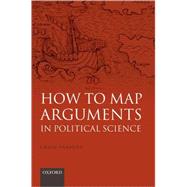How to Map Arguments in Political Science
, by Parsons, Craig- ISBN: 9780199286683 | 019928668X
- Cover: Paperback
- Copyright: 6/14/2007
To venture into explanation of political action we need some map of our basic options: what kinds of explanations are out there? Even advanced students and scholars can find the landscape difficult to chart. We confront a bewildering maze of partial typologies, contrasting uses of terms, and debate over what counts as explanation. This book makes an argument about the most useful first cut into explanations of action. It illustrates the map with reference to political examples and a wide range of political science literature, but the scheme applies even more broadly across the social sciences and history. Common terms form the sectors of the map: structural, institutional, ideational, and psychological logics. This book's novelties lie in arguments about how to best define these terms. It narrows them into distinct mechanisms, arriving at basic segments of causal logic into which all explanations of action can be broken down. It also makes them compatible, however, such that we could imagine a world in which all operated while debating how much each caused any given action. Four benefits follow. The typology directs our attention to the most basic debates about what causes what. Its framework is systematic and exhaustive, bounding our explanatory universe. It defines our main approaches in ways that facilitate both competition and combination. Lastly, it leads to revisions of prevailing views on philosophy of science and research design to encourage more open and rigorous debates. Graduate students will find no other overviews of comparable scope and precision. Scholars of all theoretical inclinations will encounter provocative challenges to their views of theorizing and use of terms.







